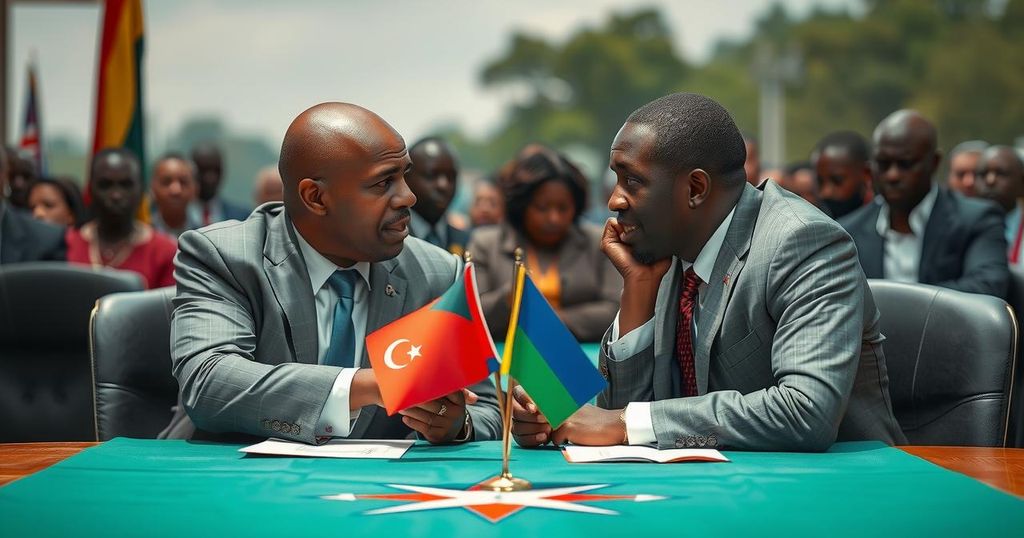Peace talks between the DRC and Rwanda aimed at resolving the M23 conflict have collapsed, exacerbating an ongoing humanitarian crisis. The M23 group, primarily composed of defector Tutsi soldiers, has increased violence against civilians and affected local services. Historical ethnic tensions and Rwanda’s perceived involvement complicate peace efforts. Both nations must engage in dialogue with the assistance of international organizations to address these deep-rooted issues and work towards lasting peace.
On December 15, it was reported that the Democratic Republic of Congo (DRC) and Rwanda have withdrawn from planned peace discussions in Angola. These negotiations were intended to address and reduce the ongoing M23 rebel conflict within the DRC. The M23 group, which originated in 2012 from Tutsi soldiers who defected from the Congolese military, has contributed to a humanitarian crisis characterized by increased violence, including attacks on civilians and the recruitment of child soldiers.
The DRC has expressed concerns about Rwanda’s involvement in the M23 conflict, perceiving Rwanda’s advocacy for dialogue with M23 as a potential threat. The historical context of ethnic tensions, particularly stemming from the 1994 Rwandan Genocide, adds a layer of complexity to the current situation, as this conflict has repercussions that extend into both nations. As peace talks collapse, human rights violations continue, affecting the provision of education and healthcare for local populations.
Congolese spokesman Giscard Kusema stated, “Rwandans have set a precondition for the signing of an agreement that the Congo hold a direct dialogue with the M23.” Additionally, reports suggest that Rwanda is willing to withdraw its defensive measures contingent upon the DRC’s elimination of Hutu rebel groups that have perpetrated violence against Tutsis. President Felix Tshisekedi of the DRC ultimately dismissed these proposals, escalating tensions and leading to claims from international organizations, such as the United Nations (UN) and the African Union, about Rwanda’s alleged support for the M23 group. Rwanda has denied any wrongdoing, maintaining that its military presence in the DRC is purely defensive.
The withdrawal from the peace talks is seen as an impediment to diplomatic resolution. A successful peace process necessitates both parties acknowledging and addressing their respective concerns over ethnic tensions. Furthermore, international organizations must play an active role in mediating these discussions to encourage understanding and facilitate meaningful dialogue.
The decision by Congo and Rwanda to forgo peace negotiations has exacerbated the ongoing M23 conflict, leading to a more profound humanitarian crisis. Engaging in dialogue is paramount to restore stability in the region; failure to do so threatens further deterioration of the situation and undermines the possibility of achieving a sustainable peace agreement in the future.
The ongoing conflict in the Democratic Republic of Congo involves the M23 rebel group and is rooted in complex historical ethnic tensions, particularly between Hutu and Tutsi communities. The M23, originally formed by defectors from the Congolese army, has played a significant role in regional violence since its inception in 2012. Rwanda, fearing threats from Hutu rebels based in the DRC, has often been linked to the conflict, causing distrust between the two nations. Recent peace negotiations aimed at alleviating this strife have been thwarted, indicating ongoing instability and pressing humanitarian issues within the region.
The failed peace talks between the DRC and Rwanda underline the urgent need for dialogue and cooperation to resolve the ongoing M23 conflict. The historical context of ethnic tensions, combined with the complexities of modern geopolitical relations, necessitates a new approach to mediation involving international bodies. Without such efforts, the region may continue to face severe humanitarian consequences and instability, impeding any long-term resolutions necessary for peace.
Original Source: theowp.org






